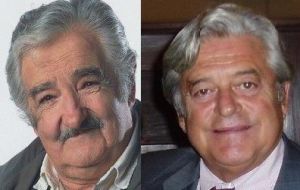MercoPress. South Atlantic News Agency
Mujica and Lacalle lead June 28 Uruguayan presidential primaries
 Candidates Mujica and Lacalle, the two hopefuls with greater chances of disputing the October election
Candidates Mujica and Lacalle, the two hopefuls with greater chances of disputing the October election With less than two weeks for the presidential primaries in Uruguay, Senator Jose Mujica, a former guerrilla captain, is leading comfortably and should on June 28th emerge as the candidate of the left wing ruling catch-all coalition, Broad Front. In the opposition the most probable presidential candidate will be former president Luis Alberto Lacalle.
The other main candidate for the ruling coalition, former Economy minister Danilo Astori, has been hospitalized since May 21st, allegedly with acute pneumonia and following on medical instructions with no chances of returning to the campaign trail on time, plus the fact he has “run out of funds”.
This means that Mr. Astori who was the candidate handpicked by president Tabare Vazquez, at the most can reach an agreement to complete the ticket as vice-president candidate, with Senator Mujica.
According to the latest public opinion polls Mujica, 74, has the support of 59% of the Broad Front, while Astori has dropped to 31% and a third candidate, Marcos Carambula trails with 7%. Mujica the former guerrilla counts with the structure of his own Tupamaros movement, the grass roots organization of the Communist party that dominates trade unions, and his own ability to communicate as a “sage old man” who preaches “common sense with charm”.
In the main opposition force Partido Nacional the two hopefuls are former president Luis Alberto Lacalle who is slightly ahead and keeps advancing, and Senator Jorge Larrañaga, who is trailing closely but for weeks now has seen his position gradually slide.
On June 28th Uruguayan political parties will be nominating their presidential candidates and their national conventions which will decide on the completion of the ticket and name candidates for May 2010 Mayors’ election in the 19 counties in which the country is divided.
Next October 25th Uruguay votes for a new president (no re-election) plus the 99 members of the Lower House and 31 Senators. For the presidential candidate to win he must obtain 50% of votes cast plus one; if not there’s a runoff a month later.
The current ruling coalition, created in 1971 and which managed to win for the first time in 2005 in the first round had consolidated as favourite for October 2009. But in the last two years underwent serious internal rifts, eroded unity and was split on the nomination of party authorities and election candidates. President Vazquez, who was the main cohesion factor in the coalition, has been repeatedly rebuked regarding important legislation, policies and on his decision to have Astori succeed him.
Furthermore the commodities boom of the first few years boosting income, employment and revenue has suffered seriously, since last year, with the collapse of the world economy.
The latest public opinion polls from early June shows that “if elections were held on Sunday June 14th, the Broad Front would collect 43% of the vote; the Nacional party, 39%; Partido Colorado, 8% and Partido Independiente, 1%, while another 9% remains undecided or would not reply.
“Based on this numbers there would be a second round”, but this is not a forecast but rather a picture of the current situation, points out Luis Eduardo Gonzalez, one of Uruguay’s best known pollsters.
And if there’s a runoff in November a simple addition would be indicating that the opposition candidate wins: 39% plus 8% plus 1%.
Well aware of this situation the ruling coalition is rapidly trying to heal wounds and find a quick internal equilibrium that can attract those votes still undecided or have moved to a less left leaning option.
Close aides of Mujica have revealed that he has sent clear messages to Astori, inviting him to join the ticket and will be announcing, once nominated, several names of his future economic team that are in line with what local businessmen, foreign investors and multilateral credit organizations would like to see.
Mujica, who entered “armed politics”, according to his own words, 45 years ago to combat the local oligarchy, big farm owners and multilateral credit organizations such as the IMF and World Bank who were “squeezing” Uruguay with their policies, recently met with an IMF delegation which allegedly only had praise for the presidential hopeful and his future plans.




Top Comments
Disclaimer & comment rulesCommenting for this story is now closed.
If you have a Facebook account, become a fan and comment on our Facebook Page!